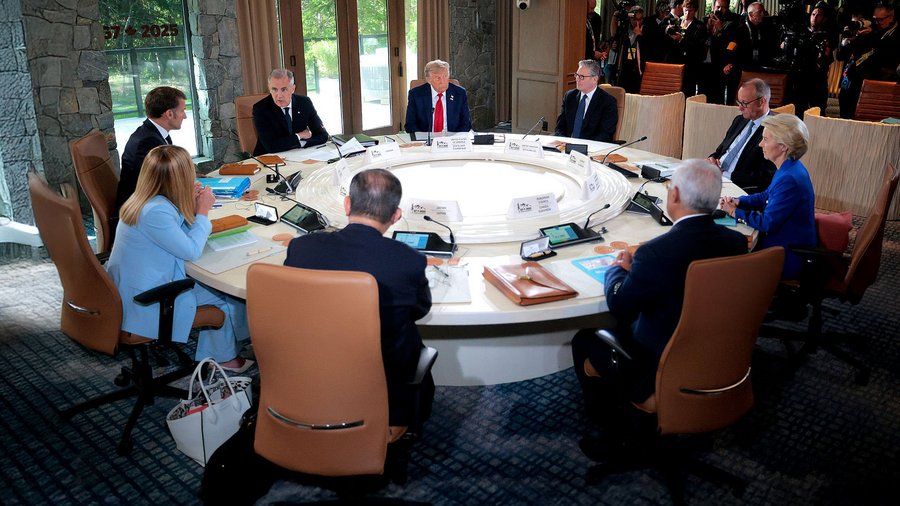Salzburg Global Fellow Hope Ngo explores how shifting U.S. foreign policy under the Trump administration is impacting America's allies
This article was written by Salzburg Global Fellow Hope Ngo, who attended the Salzburg Global American Studies program on “What Next for the U.S.? What Next for America in the World?” in September 2025.
The views expressed here belong to this Fellow individually and should not be taken to represent those of any organizations to which they are affiliated.
In February 2021, then-President Joe Biden stood before the Munich Security Conference with a statement that America's allies needed to hear. “America is back,” he said, and with that came the understanding that the United States needed to earn back the trust that had eroded between 2016 and 2020.
If, as Biden pointed out, the world was at an inflection point then, it can be said we are in a worse place today. The COVID-19 pandemic may be in the rearview mirror, but cuts to funding may bring HIV back from the brink. Vaccine hesitancy is threatening the resurgence of childhood illnesses like measles, mumps, rubella, and polio. And though many of us have come to take internet shopping for granted, cross-border trade as we knew it could become a thing of the past, too. As Jason Hu, who served as Taiwan’s representative to the U.S. from 1996 to 1997, and Minister of Foreign Affairs from 1997 to 1999, said during an interview, “We are at a very turbulent time in terms of global affairs, there are more wars than perhaps any time in the past 50 years, all still fighting with no end.”
As Hu also pointed out, much of the shift can be attributed to one person, namely Donald Trump, as he continued, “I think there's a man who changed history. He did not start any more wars, but he started a global conflict, fighting with tariffs, and the global financial order may be changed.”
It’s no secret that political scientists and foreign policy experts believe the United States will emerge from Trump's second presidential administration significantly weaker. Even as countries try to keep Washington in the loop, there are also signs that its traditional partners are working to protect themselves against the whims of an unpredictable U.S. administration. Germany has said it would fund a package of military and munitions equipment under NATO’s Prioritised Ukraine Requirements List (PURL) initiative. Credible voices from within partner countries like Australia are calling for changes to existing alliances, particularly in the area of trade. The unpredictability of U.S. foreign policy today is also reflected in the gradual rise of American skepticism among countries which now view the U.S. less favorably than China.
Not all of it is bad news for the United States. If Washington has ever felt that allies and partners take it for granted, it can rest assured that is no longer the case. In the area of defense alone, spending around the world has gone up – in Europe, NATO members committed to spending 5% of GDP on rearming itself. In Taiwan, the government has committed to setting aside close to 3% of its GDP, even though that spend was stymied by an opposition-majority legislature. In the Philippines, the country committed itself to increase defense spending. Still, the fact that these moves are driven by skepticism over America’s ability to fulfill previous commitments and treaties cannot be ignored.
This is not to say there is no chance of a course correction. In the last century, we’ve seen U.S. foreign policy change from one of isolationism and neutrality to one of involvement, and we have no reason to believe it won’t happen again. But if the international community wants to future-proof itself, there are lessons we need to take to heart. Most importantly, this includes the need to protect ourselves from the whims of an unpredictable electorate for whom foreign policy considerations do not play a role.
At the end of the day, those of us that live outside of the United States may need to take to heart the words of another one of Taiwan’s “greats” – its former Foreign Minister Fredrick Chien – one of the architects of U.S.-Taiwan policy after derecognition in 1976. Rightly or wrongly, Chien believed American foreign policy could be traced back to former U.S. Secretary of State Henry Kissinger, as Chien said that “…Kissinger is a realist. He believed in what Hans Morgenthau wrote [in] ‘Politics Among Nations.’ And his realistic view is held by many, many diplomats of the United States… this is why the U.S. considers her national interests way above any of her friendly countries.”
Under these circumstances, international stability in a decade could well mean setting aside America’s wants and considering the world’s needs – particularly in the areas that really matter: health and human rights, respect for the rule of law, trade, technology, climate change, and the environment.
Marie Nette "Hope" Ngo has worked for over two decades as a journalist covering regional politics and business for organizations including Bloomberg Television, CNN International, and NBC Asia. She is currently a news anchor at International Community Radio Taipei and is host of the program "Taiwan Talk". She obtained her Master of Social Sciences in Media, Culture, & Creative Cities (with Distinction) from The University of Hong Kong. She is a Salzburg Global Fellow.


